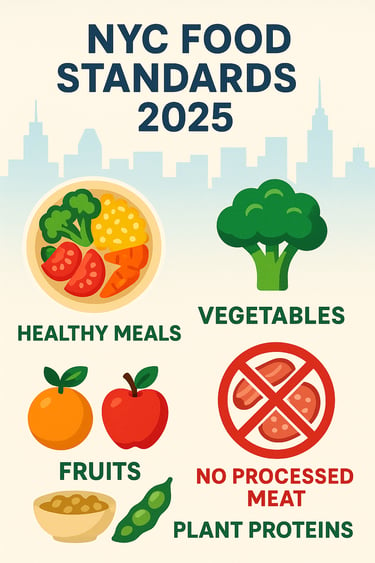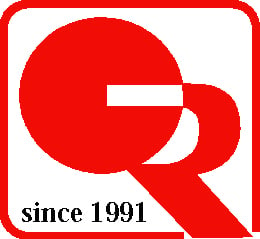NYC Food Standards 2025
Comprehensive Professional Analysis of NYC Food Standards 2025 for Food Handlers
NUTRITIONNEWSMARKET REPORTREGULATIONSSTANDARDS
8/30/20255 min read
NYC Food Standards 2025: Comprehensive Professional Analysis for Food Handlers
Executive Summary
The NYC Food Standards 2025 represent a significant evolution in municipal food policy, with implementation required by July 1, 2026. These enhanced standards affect approximately 219 million meals and snacks served annually across 11 city agencies, marking the most comprehensive update since the program's inception under Executive Order 122 in 2008. Key changes include the complete elimination of processed meats, expanded artificial sweetener bans to all ages, and stricter plant protein requirements.
Regulatory Framework and Authority
Historical Context and Legal Foundation
The NYC Food Standards originated from Executive Order 122 (2008) under Mayor Bloomberg and were significantly updated through Executive Order 8 (2022) under Mayor Adams. The 2022 executive order formally integrated the Good Food Purchasing Program (GFPP) principles, establishing NYC's commitment to transparency in procurement practices affecting local economies, environmental sustainability, workforce conditions, animal welfare, and nutrition.
Critical Changes for Food Service Operations
Section I: Purchased Food Standards - Professional Impact Analysis
The blog's assessment of ingredient bans is accurate but requires expansion for professional implementation. The complete elimination of artificial sweeteners affects all age groups, expanding beyond the previous restriction to minors only. This represents a significant departure from federal guidelines, which still permit these additives.
Sodium Limitations and Professional Compliance
Sodium thresholds remain at ≤480mg per serving for general populations, with ≤420mg for children under 5 years. While NYC adults consume an average of 3,292mg sodium daily, well above the recommended 2,300mg, these institutional limits could contribute to population-level reductions. Food handlers must implement dual procurement systems for age-specific requirements.
Professional Implementation Strategies:
· Dual Inventory Systems: Separate low-sodium products for pediatric programs
· Supplier Certification: Require detailed nutrition analysis from vendors
· Recipe Modification: Reformulate existing recipes to meet sodium thresholds
· Natural Flavor Enhancement: Utilize herbs, spices, and acid-based flavor profiles
Processed Meat Elimination - Critical Operational Changes
The complete ban on processed meats by July 2026 aligns with WHO's 2015 classification of processed meats as Group 1 carcinogens. This affects traditional menu staples including bacon, sausage, ham, hot dogs, and deli meats. The blog correctly identifies this as a significant operational challenge, particularly for breakfast programs and sandwich preparations.
Evidence-Based Rationale:
· 18% increased colorectal cancer risk per 50g daily consumption
· NYC previously eliminated processed meats from schools in 2019
· Aligns with American Cancer Society recommendations
Professional Menu Adaptation Requirements:
· Protein Diversification: Expand plant-based protein offerings (beans, lentils, tofu, tempeh)
· Fresh Meat Alternatives: Increase fresh poultry and seafood procurement
· Flavor Profile Maintenance: Develop seasoning blends to replicate familiar tastes
· Cost Management: Plant proteins typically offer better cost-per-serving ratios
Plant Protein Enhancement and Sustainability
The enhanced plant protein requirements exceed the blog's coverage. The 2025 standards mandate increased weekly plant protein servings with emphasis on "whole or minimally processed" sources. This aligns with the 2025 Dietary Guidelines Advisory Committee recommendations to prioritize plant proteins over animal proteins.
Professional Implementation Framework:
· Menu Planning: Minimum 2 plant protein servings weekly per meal type
· Beef Reduction: Maximum 2 servings weekly for three-meal sites
· Staff Training: Culinary techniques for legume preparation and flavor development
· Nutritional Balance: Ensure amino acid completeness in plant-based meals
Section II: Meal and Snack Service Standards
Nutritional Requirements - Enhanced Analysis
The blog accurately presents the caloric and sodium targets but lacks detail on enforcement mechanisms. Three-meal sites must not exceed 2,000 calories and 2,300mg sodium daily, with saturated fat and added sugars limited to <10% of total calories.
Deep-Frying Prohibition Impact
The prohibition of deep-frying equipment in new kitchens represents a fundamental shift in food preparation methods. Existing facilities may continue using fryers but are encouraged to phase them out. This affects:
· Equipment Procurement: Alternative cooking methods (baking, air frying, steaming)
· Menu Development: Reformulation of traditionally fried items
· Staff Retraining: New cooking techniques and food safety protocols
· Cost Implications: Initial equipment costs offset by reduced oil expenses
Beverage Standards and Professional Considerations
The juice phase-out recommendation mentioned in the blog is supported by evidence showing juice provides concentrated sugars without fiber benefits. Water must be available at all times, with juice limited and preferably eliminated.
Professional Beverage Management:
· Primary Beverage: Plain water as default option
· Milk Standards: 1% or non-fat for ages 2+ years
· Flavored Milk: Restricted sugar content (≤10g per 8 fl oz)
· 100% Juice: When offered, must meet strict criteria
Section III: Population-Specific Standards
Special Population Considerations
The blog's coverage of population-specific standards requires expansion for professional application:
Population
Caloric Adjustment
Special Requirements
Adults in Custody/Youth Detention
≥2,200 calories/day
Milk exclusion from lunch/dinner analysis
Shelter Residents (14+)
Increased caloric needs
Similar to detention standards
Therapeutic Care
Medical diet precedence
Plant-based options on request
Emergency/Disaster Response
No restrictions
Long-term nutrition planning encouraged
Religious and Cultural Accommodations
Professional food handlers must navigate religious dietary laws and cultural preferences while maintaining standard compliance. The standards require solicitation of client feedback including cultural preferences, demonstrating NYC's commitment to food equity.
Environmental Sustainability and Good Food Purchasing Integration
Regenerative Agriculture and Local Sourcing
The 2025 standards emphasize regenerative agriculture and local sourcing as part of NYC's Good Food Purchasing commitment. The blog mentions this briefly but doesn't explore professional implications:
Sustainability Requirements:
· Carbon Footprint Reduction: 3-15% reduction targets from baseline
· Local Sourcing: Priority for regional suppliers
· Organic Preferences: USDA Organic as baseline for sustainable certifications
· Food Waste Audits: Required implementation with source reduction strategies
Supply Chain Transparency
Professional food handlers must work with suppliers providing transparent reporting on labor practices, environmental impact, and sourcing origins. This includes:
· Vendor Compliance: Contractual commitments to labor law adherence
· Public Reporting: Food contract and supplier transparency
· Worker Rights: Support for freedom of association and collective bargaining
Professional Implementation Challenges and Solutions
Financial and Operational Considerations
The blog correctly identifies cost concerns but lacks specific mitigation strategies:
Budget Management
· Plant Protein Economics: Generally lower cost per serving than animal proteins
· Bulk Purchasing: Economies of scale for compliant ingredients
· Waste Reduction: Longer shelf life of many plant-based items
· Training Investment: Short-term costs for long-term compliance
Supply Chain Adaptation
· Vendor Partnerships: Early engagement with suppliers for product development
· Quality Assurance: Enhanced testing protocols for new products
· Backup Systems: Multiple supplier relationships for critical items
· Seasonal Planning: Accommodation of local, seasonal availability
Staff Training and Development
Professional development requirements extend beyond the blog's coverage:
Comprehensive Training Programs:
· Nutrition Education: Understanding of dietary guidelines and health impacts
· Culinary Skills: Plant-based cooking techniques and flavor development
· Food Safety: Updated protocols for new ingredients and preparation methods
· Cultural Competency: Serving diverse populations with dietary restrictions
Monitoring, Evaluation, and Continuous Improvement
Compliance Tracking Systems
Professional food service operations must implement robust monitoring systems:
Key Performance Indicators:
· Ingredient Compliance: 100% adherence to banned substance lists
· Nutritional Targets: Daily and weekly nutrient goal achievement
· Procurement Metrics: Percentage of purchases meeting sustainability criteria
· Client Satisfaction: Feedback on taste, cultural appropriateness, and satiety
Quality Assurance Protocols
· Regular Audits: Internal and external compliance verification
· Documentation Systems: Detailed record-keeping for all procurement and preparation
· Corrective Action Plans: Procedures for addressing non-compliance
· Continuous Improvement: Regular review and updating of procedures
Future Implications and Industry Trends
Alignment with National Trends
The NYC standards anticipate federal policy directions, with the 2025-2030 Dietary Guidelines for Americans expected to emphasize plant-based proteins. Food service professionals should prepare for broader industry adoption of similar standards.
Technology Integration
· Menu Planning Software: Integration of nutritional analysis and compliance checking
· Supply Chain Management: Digital tracking of ingredient sourcing and compliance
· Client Engagement: Digital platforms for feedback and dietary accommodation
Conclusion and Recommendations for Food Service Professionals
The NYC Food Standards 2025 represent a paradigm shift requiring comprehensive operational restructuring. Unlike the blog's consumer-focused perspective, professional implementation demands:
1. Immediate Action: Begin planning and supplier negotiations now for July 2026 compliance
2. Comprehensive Training: Invest in staff development for new cooking methods and nutrition knowledge
3. Supply Chain Partnerships: Develop relationships with compliant vendors early
4. Financial Planning: Budget for initial transition costs while recognizing long-term savings potential
5. Quality Assurance: Implement robust monitoring systems to ensure ongoing compliance
The standards represent NYC's leadership in institutional food policy, with potential for national replication. Food service professionals who successfully adapt to these requirements will be positioned to lead industry-wide transformation toward healthier, more sustainable food systems.
Professional Resources:
For detailed implementation guidance, food service professionals should monitor the forthcoming Implementation Guide from the NYC Health Department, expected before July 2026.
Original standard can be downloaded from here.


Tel: +852 25172316
© 2024. All rights reserved. All information on this site is without any contractual, financial or otherwise any other liability. For binding information, please contact us and include your concerns / requirements in enquiry, quotation, contract and shipping documents.
5/Fl. Qualipak Tower, 122 Connaught Road West
Hong Kong.
China Business Ltd. T/A Orient Resources Company


Fax: +852 25178741
